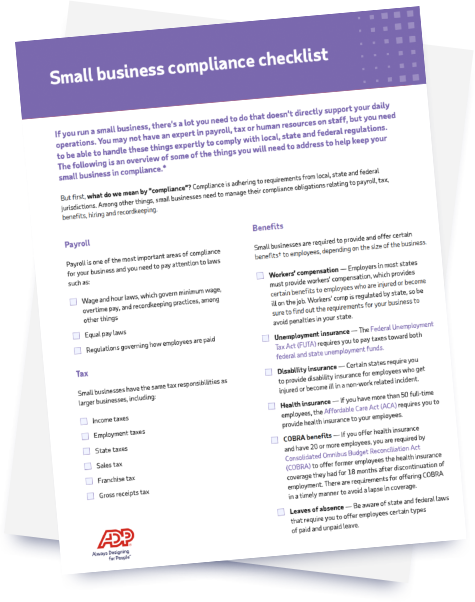Compliance in business is adherence to all local, state and federal jurisdictions that govern your operations. In terms of employment, this can mean paying employees correctly, filing taxes on time, administering the required benefits, following appropriate hiring practices and keeping accurate records.
Small business compliance
If you run a small business, you may not have a payroll or human resource expert on staff like a larger organization might, but you still need to comply with employment regulations all the same. Some of the areas important to small business compliance include:
Payroll
To run payroll in full compliance, you may need to:
- Abide by the minimum wage and overtime pay requirements of the Fair Labor Standards Act (FLSA).
- Provide equal pay for equal work regardless of gender in accordance with the Equal Pay Act (EPA).
- Follow state and federal guidelines when using direct deposit and pay cards.
Taxes
Whether you file quarterly estimated taxes or an annual tax return for your small business, be aware of filing deadlines and deposit frequencies. Requirements may vary across the local, state and federal levels. You might also need an Employer Identification Number (EIN) and a business entity type to file your taxes properly.
Benefits
Depending on the size of your organization, you may need to offer these benefits to your employees to maintain small business compliance:
- Workers’ compensation
- Unemployment insurance
- Disability insurance
- Health insurance
- Consolidated Omnibus Budget Reconciliation Act (COBRA) benefits
- Leave of absence
Hiring
Recruitment might be simpler in smaller organizations, but that doesn’t mean the regulations are any less strict. Your hiring practices must comply with Equal Employment Opportunity Commission (EEOC) and Office of Federal Contract Compliance Programs (OFCCP) guidelines. Additionally, all new employees are required to complete a Form I-9 to verify employment eligibility. Some states have also made E-Verify mandatory.Record keeping
Under the Fair Labor Standards Act (FLSA), you may have to keep certain employee payroll records for a minimum of three years. The information must remain confidential and in a secure location at all times. Depending on where you do business, you might have to abide by state record keeping requirements, as well.
New COVID-related regulations and tax credits
The COVID-19 pandemic has changed the nature of how we work. For updates on COVID-related legislation that impacts payroll, tax filing and employee leaves of absence for small businesses, please visit our ADP Employer Preparedness Toolkit: Coronavirus Disease (COVID-19).
How you can improve small business compliance
Worrying about compliance requirements takes time away from growing your business and increasing your profits. But you may be able to change that by working with a payroll service provider like ADP. We have proven expertise in helping small businesses with payroll, taxes, human resources and other compliance needs.
Learn more about our services for small businesses or download our Small Business Compliance Checklist.


